#Language tips
Explore tagged Tumblr posts
Text
Keeping up your Languages when you’re Busy
Confession: I’ve been slacking on Japanese recently because my life has been so hectic recently. So here are some of the ways I’ve been trying to keep it in my brain when I can’t dedicate a lot of time to studying.
CHANGE YOUR PHONE LANGUAGE
This applies to computers as well! This is the easiest way to ensure you see at least some of your target language every day. It’s good for any level, even beginners.
If you haven’t already done this, do it now. I understand that some things are important and you need to be sure you understand them — in that case, you can always change individual apps to have different languages, just look up the app name in settings.
Podcasts/Music
Find some podcasts in your target language and listen to them before bed, during your commute, whatever. There are lots of podcasts made specifically for learners, or you can look up topics in your target language to find a podcast you might enjoy.
Music is also an amazing way to hear your target language being used. If you find an artist you like, that’s another good way to study your TL! Follow them on socials, look up interviews with them, etc.
Talk to Yourself
Any spare minute you have, talk to yourself in your target language. It doesn’t need to be out loud. You can have a conversation with yourself, try to express how you’re feeling, make up stories, or just describe the things around you in your target language. This is also a good way to see what kind of vocabulary you’re missing.
Apps
Duolingo has fired a ton of translators and started using crappy AI translations — so they’re probably not the best choice.
I’d recommend dictionary app that has some sort of flash card feature is also good, or an anki deck. Drops is good, and has a lot of languages, but keep in mind you’ll need audio. Anything that’s easy to get out and do for even just a few minutes is perfect.
Apps won’t teach you a language on their own, but doing a little every day helps remind me the language exists and keeps it in my mind.
Texting/Writing/Posting
Whether your friends know your TL or not, force them to experience it by randomly messaging in Japanese! Or, if you feel fancy, download an app like “HelloTalk”, “Tandem”, “Speaky”, “Tabee”…there are a lot.
If you keep a digital journal (like I do…inconsistently), try to write some entries in your TL.
If you have a blog, which I assume you do, post in your TL. Even if you’re a beginner, you can make a sideblog dedicated to saying stuff like “I’m hungry” and “Green is my favourite colour” in your target language.
Open your notes app and just write random words you can remember or sentences you can string together.
I know it’s really difficult, and don’t beat yourself up because you aren’t studying as hard. A language can be a lifelong companion — you’ll have phases of studying constantly, and sometimes it’ll take the back seat, but there’s no rush to learn it. Have a great day :)!
#language#language learning#langblr#languages#learning japanese#learning Spanish#learning French#Quinn posts#language learning apps#language learning resources#language learning advice#language tips#foreign languages#language resources#studyblr#100#my language tips
343 notes
·
View notes
Text
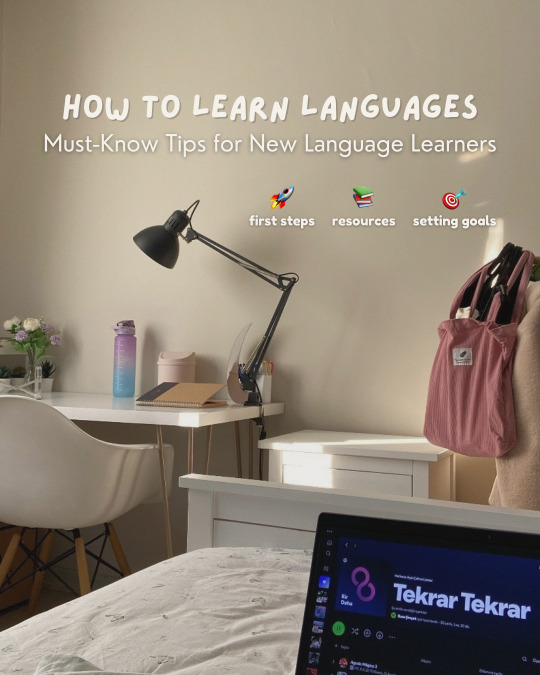
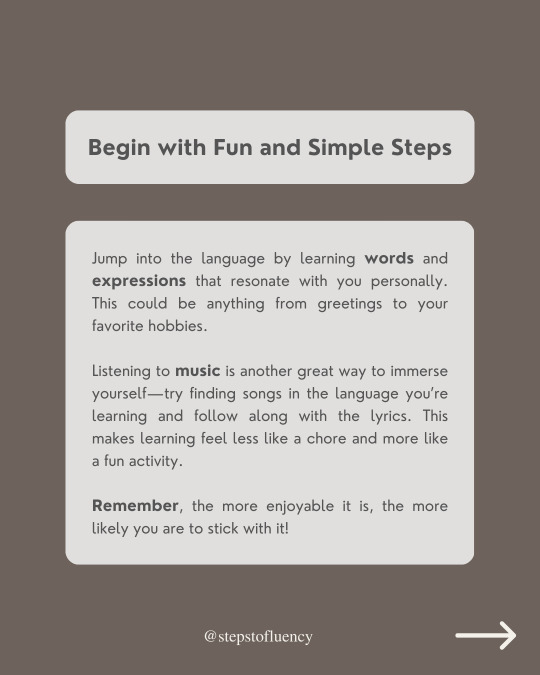

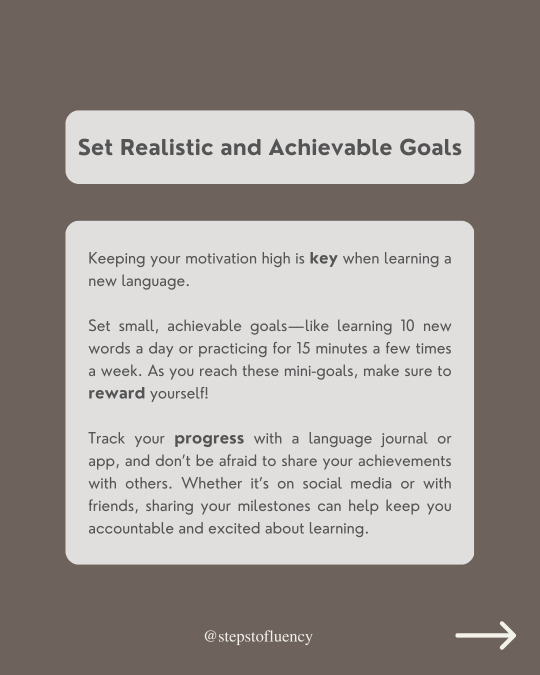

new tips from your bestie 💌
follow my studygram for more: @stepstofluency
#studyblr#langblr#buse#language learning#studygram#learning languages#study#languages#study inspo#study space#i love languages#language tips#foreign languages#study tips
129 notes
·
View notes
Text
Spanish Media/Input Recommendations?
Can you guys comment me some good media/input recommendations for someone learning Mexican/Spain Spanish? I' talking about any and all that you guys find interesting, whether you learned Spanish on your own or it's your native language!
Books
Podcasts
Tv Shows
Movies
Youtube channels
Songs/Musical Artists
Favorite Spanish teachers/tutors on Italki
Literally anything!
Thank you guys <3
#spanish studyblr#spanish langblr#spanish learning#spanish language#spanish#langblr#langblog#language tips#language learning#foreign languages#languages#language studyblr#language study#language goals#learn spanish#italki#spanish podcast#spanish books#university student#college student#español#mexican spanish#student life#student#college studyblr#college studyspo#language resources#language blog#languageblr#language learning tips
246 notes
·
View notes
Text
Language Vocab Study Method #1
A creative albeit odd way of studying and memorizing new vocab is to use it as an insult.
When I first started learning Chinese, I was overwhelmed with the amount of vocab I had to learn just to master the basics, so me and my friends decided to turn it into a game which we still use for those odd words that just don't stick for some reason. This can be used for all languages, not just Chinese.
E.g. 你是一个惊艳的股市 (Nǐ shì yīgè jīngyàn de gǔshì): You are a breathtaking stock market.
他是一座敌视的天文馆 (Tā shì yīzuò díshì de tiānwénguǎn): He is a hostile planetarium.
她是一台偷偷摸摸的烤面包器 (Tā shì yī tái tōutōumōmō de kǎo miànbāo qì): She's a sneaky toaster.
#it may be odd but it works#languages#if it works it works#chinese#language learning#language#college life#slavic roots western mind#studyblr#study tips#study advice#language tips#learn chinese
24 notes
·
View notes
Text
Quick tip: as silly as It sounds, watching kids show in the language you're learning helps a lot ! :D I mean, if they're meant to teach kids to speak their very first language, why wouldn't it help older people learn a new one?
If you want to get fluent you have to view it as starting from zero, the same way everyone started from zero when they learnt their mother/first language as kids! Good luck!
#language learning#language study#english language#free studies#french language#french studyblr#italian studyblr#korean language#korean learning#Language learning tips#Learning tips#Language learning#french learning#Italian learning#spanish learning#english learning#Portuguese learning#languages self learning#Learning tricks#language tips
25 notes
·
View notes
Text
Language learning – Introductory tips for self taught beginners
Warning, this is a loooong read. Feel free to skip to the TL;DR at the end.
In this post, I will detail a few tips which have helped me (a self taught language hobbyist) with the beginning steps of learning languages such as English, Korean and Japanese. This is not a guide on how to achieve fluency quickly, it is meant to be an introduction to language learning. This is also based on my own experiences; feel free to disagree or correct me.
We will go over these points:
How do I start learning a language?
What should I use? Is an app better than online courses?
Do I learn grammar or vocabulary first?
How much should I study?
Should I practice immersion?
Where do I find resources/books?
I feel frustrated. / I am not learning anything. /This is too hard, maybe it's not for me.
How do I start learning a language?
This is the first thing you will ask yourself when you decide you want to start learning a language. Whether it is for work, for studying, traveling or just for fun, most people feel overwhelmed at the thought of how or where to start.
The truth is that there is no set path to start learning a language, but researching the language before studying can help relieve your worries over it and give you an idea of how to start. Keep in mind that languages which have different alphabets/writing systems (i.e. Japanese, Chinese, Arabic) take longer for a native Germanic/Romance language speaker (i.e. English, French) to learn and achieve fluency, and vice versa, so if you do not have a second language as of yet, consider choosing a Germanic/Romance language as a soft start. I'll detail a suggestion as to where to start in point 3.
What should I use? Is an app better than language courses?
The current language learning app ecosystem is a far cry from what it used to be (yes, I'm talking about Duolingo and Memrise), but they are still your main allies if you have a busy schedule and want to learn a language. However what I've found is that simply tapping away in an app and taking notes isn't enough – sometimes the apps don't explain certain grammar rules, or they're locked behind monthly paywalls. As such, you have to find the answers elsewhere.
Here are some things which will make your life and your studying much easier if you are self taught and on a budget: books on the language (for grammar, you can find PDFs online), language channels (for more thorough and practical explanations, YouTube is the main hub for it), and regular media in the language of your choosing (for vocabulary, it can range from music to series/movies). If you have a friend who speaks the language, or perhaps is learning it with you, that also works. In my opinion, learning is better when you have other people to share it with.
There are also websites such as japanesetest4you.com which compile words and their meanings, just like a dictionary. The one I've mentioned not only displays kanji and its meanings, but also shows its variants in Korean and Chinese. There are many others in this same vein for other languages.
Do I learn grammar or vocabulary first?
When learning a language, most courses and classes will focus on teaching you the grammar and the writing system, which while helpful, can sometimes feel like you are going nowhere, as you know how to build a sentence, but don't have words to form it with, or can't pronounce it correctly. This is a common problem among beginners (and sometimes even more experienced language learners), don't let it discourage you.
A personal example I like to use is: To say "the sky is blue", you have to first learn what the sky is, then learn the color blue, and then learn the structure to be able to say "the sky is blue". Vocabulary is just as important as learning the grammar rules in any language; don't limit yourself to only learning how to write. So the answer is: Build a small vocabulary, learn the grammar, and then apply it in practice. It doesn't have to be correct on the first try, we've all been there. Though people learn in different ways, so perhaps you might feel like the opposite works for you. That's also completely fine.
This is another point where engaging with the language's culture and media outside of classes comes to play. Even watching a TV program during your free time and writing down words is enough, since you're also practicing listening, which is also very important and looked over. Try incorporating pronunciation and listening into your studying routines.
How much should I study?
This is a point of much debate within language learning spaces because there is no answer for it. Some might learn a language in 3 months, others might learn it in 10 years, a few can learn it in 3 weeks. It depends on what language you've chosen and the time you are able to dedicate to the language.
The best tip I can give is: if you can dedicate even just 10-15 minutes of learning each day, you can achieve the results you desire. Of course, you should increase that amount if you're able to in the future, but it's already an effort.
Consider your schedule and refer back to the first point, as the time you'll take to achieve conversational/fluency levels can vary depending on the language you choose.
Should I practice immersion?
The common view of immersion is: "speak the language at every opportunity, only engage with media in that language, and write only in that language". This is what you'll see in some of those "I learned (language) in only 3 months" videos.
Let's be realistic though, no one can start speaking German at all times when they live in the US, or Spanish when they live in France, and you'll only feel more frustrated if you force yourself to watch k-dramas without subtitles and nothing else, expecting to absorb it through osmosis. And also, you only now started learning how to say "the sky is blue".
Immersion comes in many forms, though. If you listen to a song in the language you want to learn and read the lyrics while listening, that counts as immersion. If you write a few phrases describing your day in that language as a dynamic exercise, it also counts as immersion. Immersion is what says on the tin – immersing yourself in the language – but it shouldn't bring you unnecessary stress. Also, contrary to what some might say, I do recommend you use translators, if it helps you associate words with their meanings. Don't just rely on them, though, since Google Translate can be unreliable with certain translations and meanings.
Where do I find resources/books?
This requires digging around, but I recommend you check sites like as WebArchive and YouTube. If you can, buy the books online, or borrow some from your local library. I recommend looking for actual textbooks, mainly because some of them include tidbits about the culture itself, like Genki. If you're on a budget, Reddit has a few threads which recommend apps/books, but be very careful with downloading things from random Google Drives or other file hosting websites.
Tumblr is also a very good place for learning new vocabulary. I see some blogs dedicated to sharing kanji and grammar rules, and it can be good to follow such blogs to build your vocabulary.
I feel frustrated. / I'm not learning anything! / This is too hard, maybe this is not for me.
Rome wasn't built in one day, and you definitely won't learn a language in a month or two if you are someone who is in school or has a job with long working hours. YouTube has made language learning easy, but it also has given the illusion that if you follow X method or study an N number of hours, you'll achieve fluency. That is not the case. It fails to take into account the nature of the language, its grammar rules, the writing systems, and everything else.
You don't realize this, but you definitely didn't learn how to speak in just 3 months when you were a child. Everyone learns differently, some faster than others, some slower, some have more time to study, others don't. Some people have difficulty concentrating and don't know how to make learning more fun. All I can say is: don't give up. As long as you put in some effort, even if it seems insignificant to you, you can achieve your results.
Don't feel obligated to continue learning a language if it is bothering you, though. Remember you can always take a break and come back to it another time. Who knows, maybe even during that break, you'll still be learning new words, and feel more motivated to go back.
TL;DR: Language learning is something which is more accessible now than ever, but you might find yourself confused on where or even how to begin learning a language. The key tip for learning any language is to do research, gather resources, know your own limits and how much dedication, time and energy you can invest into learning, and most important of all, to have fun with it.
I hope this can help some beginners in their journey into language learning. Thank you for reading this far!
33 notes
·
View notes
Text
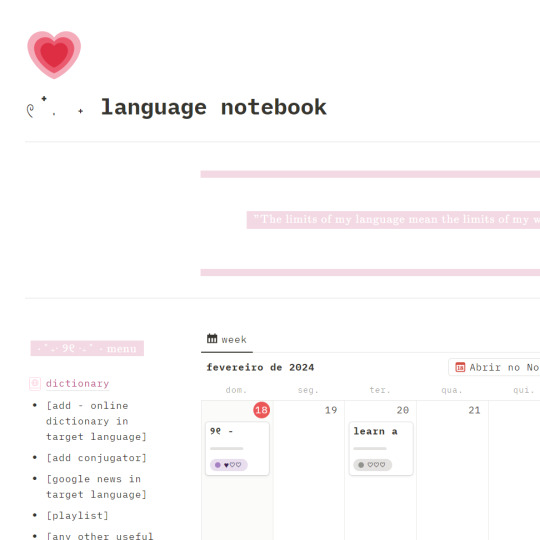

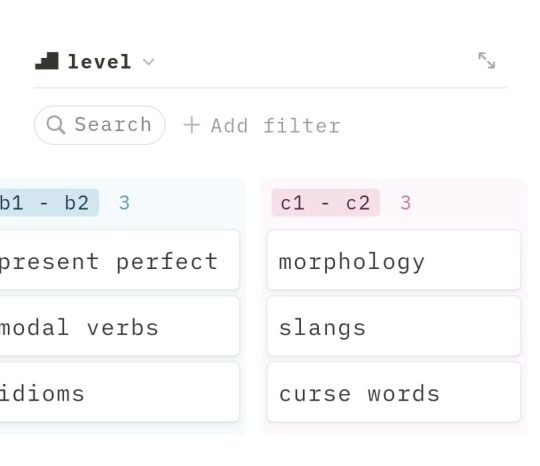
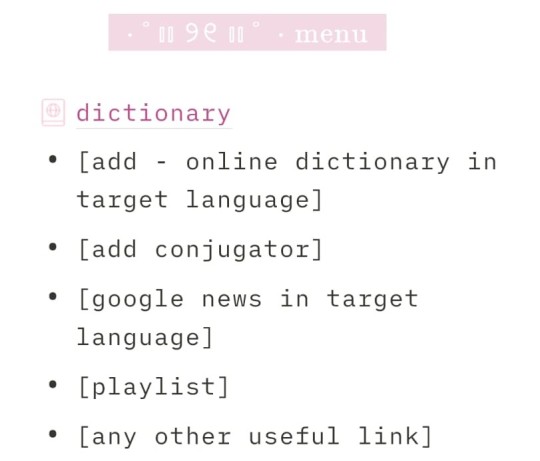
LANGUAGE LEARNING - NOTION TEMPLATE
(but make it girly <3)
Get the template here! [$2]
Language learning, the template contains:
Daily tasks to improve your studies
Challenge list
Synchronized dictionary (noun, verb, adjective, adverb)
Notebook area: create topics and take notes, divided by the CEFR Levels
Mobile friendy
#notion#notion template#studyblr#language learning#langblr#langblog#language tips#studies#languages hub#spanish#english#italian#french#duolingo#vocab#bilingual
41 notes
·
View notes
Note
I saw something where you mentioned English isn’t your first language? That’s so cool, I never would have known from the way you write! If you don’t mind me asking (and feel free to not if you don’t want to), what’s your first language? Do you have any tips for learning a second? I’m trying to learn Spanish and I LOVE it, but I do struggle a bit, especially with the confidence to speak it around other people
Hi! Thank you so much! Yes, English is not my first language. My first language is German, actually!
I do have a couple tips for learning a new language!
Some people will say to use flashcards, or pick things up naturally through listening to people, or reading, but your best approach is to balance the two. Both are good for different reasons!
Picking things up naturally help to become used to your new language. You can use social media to get used to it on your own time. Finding communities of your desired language helps. Switching your phone's language, or watching shows in that language is also helpful. Watching shows helped me specifically to erase my accent.
Really, just speak and write for practice as much as humanly possible.
Flashcards are most helpful to memorize common phrases or words. But trying to advance your language, vocabulary, or grammar will not be helpful through this method. However, in my case, it helps to become fluent and accurate in what you say.
Good luck learning Spanish!
Also, I love your writing!! You're amazing!!!!!!!❤❤❤
5 notes
·
View notes
Text
Language
Hello
I am of (stolen gen) Wiradjuri decent.
I feel that my people's culture, connection, and community has been ripped from my grasp before I even got to inherit it.
I want to learn the Wiradjuri language, help keep it alive but I need some help. Tips, advice, resource recommendations, ect for learning the language, especially one with as many cases as Wiradjuri.
I already know about Stan&Flo Grant's Wiradjuri Dictionary (based on Dr. Stan Grant and Dr. John Rudder's work)
I have mostly enjoyed learning languages on my own before, but have never had good results.
It also might be important to know that I am autistic
#wiradjuri#language#langblr#bilingual#polyglot#native languages#learning wiradjuri#native australian languages#australian native language#learning tips#language cases#learning help#study help#language tips
11 notes
·
View notes
Text
i’m currently trying to write more in german, and let’s just say that i’m bad at coming up with a topic to write about. anyways, i found a list of like 100 “philosophical” questions and i’m translating ones that i like or find interesting to german and then i’m answering them in a couple of sentences. i guess you could go on r/askreddit and answer posts on there in a word document or find questions from celebrity interviews or whatever other ideas that might come to mind. i just wanted to share this little tip i had.

#langblr#language learning#language stuff#writing tips#studyblr#foreign languages#languages#studying#deutsch lernen#studyblr language#language tips#lingblr
4 notes
·
View notes
Text

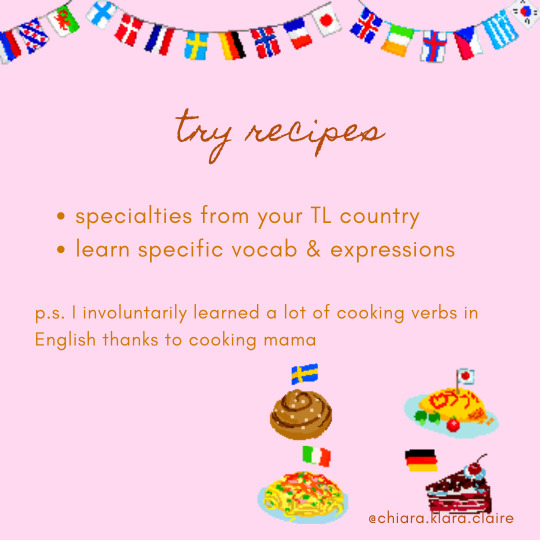
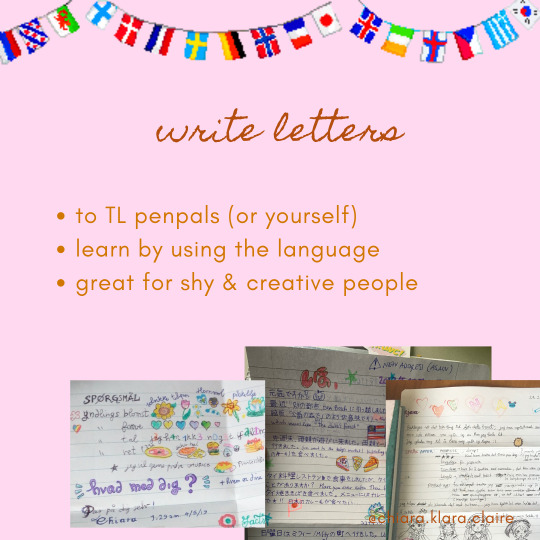
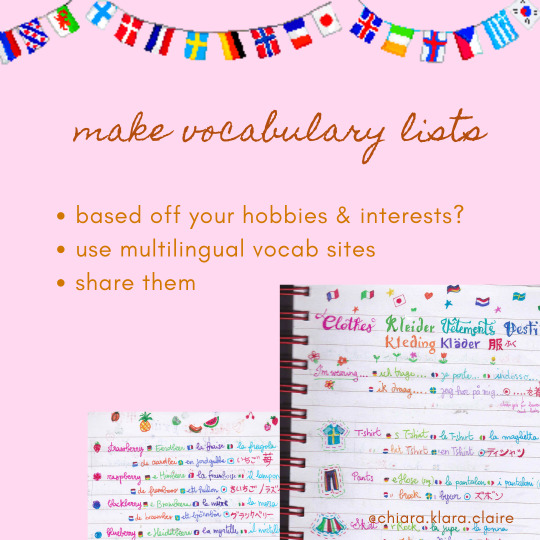

three cozy ways to practice languages (imo as a creative soul). On my masterpost you find vocabulary sites and more. Another cozy thing for me is looking up through my resources list to spice up things hehe. [art here 100% mine - @dreamyberry]
47 notes
·
View notes
Text
DROP YOUR HOTTIE VLOGGERS. I beg you✨️🫶😔💝
To my language learners besties
I once read about that VERY helpful language learning method where you just watch a youtuber you find very attractive, that is native or speaks the language you are trying to learn.
I am currently learning french, and i once read a tumblr post of a girl who got really good at french slang and pronunciation by just watching a french youtuber that she found really attractive. AND I (drops to her knees) WANT TO LISTEN TO AN ATTRACTIVE FRENCH MAN, PLEEEASE.
So, if you know any french youtuber that you find attractive... sharing is caring, honey.
Or any other youtuber that is quite good and cute and might not be that popular! In any other language, so all of us language learners besties can enjoy watching them.
For example i once liked this japanese youtuber named KOS
SO PLEASE
✨️Lets just all suggest all youtubers we find attractive pls, lets help future polyglots, lets help real globalization guurl✨️
#langblr#language#language learning#language tumblr#language tips#language learning tips#french language#french learning#polyglot#language youtubers#language help#humor#language study
4 notes
·
View notes
Text

#project batman#batman#bruce wayne#martial arts#training#exercise#fitness#work out#duolingo#language tips#english language#language learning#polyglot#français#italiano#português#deutsche#funny#humor#lol
46 notes
·
View notes
Text
can anyone recommend a good textbook for learning Spanish? I really like studying using textbooks and I have two from when I took Spanish classes but they are the most unhelpful textbooks ever and I absolutely despise using them unless I have no other choice.
preferably I’d like a textbook that focuses on grammar as vocabulary is pretty easy for me to pick up given how widely Spanish is spoken in my city.
I’m also open to any music, song, movie, book, tv show, and any other spanish language learning material! I want to be able to speak spanish with some of the people I work with and I think it’s a great and beautiful language for me to learn overall, and definitely will be the most helpful!
*I am still going to self study Japanese during my six week break from classes, but I am going to try to divide my time between spanish and Japanese with a stronger focus on spanish! May even start a six week language challenge during my break to keep me motivated and accountable!
so if you guys have any recommendations for someone learning spanish (and even Japanese) , please comment/reblog this!
thanks in advance <3
#self development#spanish langblr#spanish language#spanish#langblr#langblog#language resources#foreign languages#language tips#language learning#japanese language#languages#spanish learning#learn japanese tips#language learning goals#language learning tips#languageblr#language study#spanish studyblr#japanese studyblr#studyblr#college studyblr#uni student aesthetic#university student#college student#student life#studyblr community#study blog#language skills#study tumblr
60 notes
·
View notes
Text
100%!!!!
Stanislav shared a very helpful and powerful tip!
22 notes
·
View notes